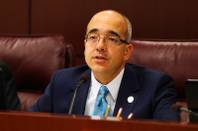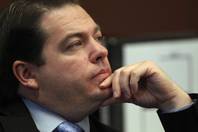Sunday, Dec. 4, 2011 | 2 a.m.
Related content

Sen. Mo Denis asks a question during a meeting of the Senate Finance Committee on the second day of the 2011 legislative session Tuesday, Feb. 8, 2011, in Carson City.

State Sen. Michael Roberson, R-Henderson, listens to discussion of the extension of temporary taxes needed to fund the state budget on the Senate floor Monday, June 6, 2011, at the Legislature in Carson City.
The lawsuit filed last week to remove a public employee from the Legislature argues that serving as an elected member of the legislative branch while working for the executive branch violates the constitution’s separation of powers.
The conservative Nevada Policy Research Institute think tank filed suit against state Sen. Mo Denis, the state and the Nevada Public Utilities Commission, where Denis works as a computer technician.
The institute frames its argument as an effort to prevent the concentration of too much power in the hands of too few. But the larger point for some is this: How can a lawmaker be unbiased when voting on taxes and spending, if his personal paycheck, pension and health benefits are at stake?
Denis, who is poised to lead the Democrats in the state Senate, is the only legislator named in the lawsuit. But 10 lawmakers during the 2011 session were also public employees — eight Democrats, two Republicans.
There were firefighter/lawmakers, teacher/lawmakers and a higher education diversity officer/lawmaker.
Public-sector workers, of course, have no monopoly on outside influence and conflicts of interest related to their jobs.
During the 2011 Legislature there also was an HOA employee/lawmaker, auto repair business spokesman/lawmaker, housing developer/lawmaker and law firm employee/lawmaker.
Smarting from the lawsuit, public employee/legislators note that often there is less transparency about lawmakers’ private-sector jobs than public employment.
State Sen. Michael Roberson, R-Las Vegas, who made a name for himself with fiery floor speeches, including hurling accusations at Democrats for being controlled by public employee unions, wouldn’t comment on the lawsuit against Denis. But he maintains that public employees have too much influence in Carson City.
“It seems to me that the Democratic caucuses are dominated by public employees ... As a result, public-sector unions seem to have disproportionate influence over policy,” he said.
For some, however, the lawsuit raises a question that should be asked of all legislators to see who or what might influence their decisions: Where do they get their day wages?
Roberson, for one, will likely get more questions about his day job. He is “of counsel” at Kolesar & Leatham, a Las Vegas law firm. In October, a few months after it became clear that he would lead the state Senate’s Republican caucus, the principals at his firm formed Kolesar & Leatham Government Affairs to lobby the Legislature.
The lobbying shop will be headed by Republican consultant Robert Uithoven and former state Senate candidate Patrick McNaught, Uithoven said.
Roberson said he is not associated with the government affairs operation — it’s a separate LLC — and will receive no financial benefit from its clients. But he acknowledged that the principals of the lobbying operation are also the founding partners at his firm.
The timing of the firm’s decision is sure to be questioned: Did they get into lobbying to make money off their employee’s new political power?
“I don’t think that’s the case,” Uithoven said. “It’s a good business decision to do (government affairs work) in-house.”
He rattled off other law firms that have government-affairs practices, some of which employ lawmakers.
State Sen. Ben Kieckhefer, R-Reno, resigned as spokesman for the Health and Human Services Department after being elected in 2010. He now does public relations for McDonald Carano Wilson, a law firm that lobbies the Legislature.
“Separation of powers within our government is critical,” he said. “When I looked at my position as a potential legislator and executive branch employee, there’s no way I could do both.”
Now, he said, a firewall separates him from his firm’s lobbyists.
Sen. Sheila Leslie, D-Reno, a Washoe County court system employee, said conflicts are natural in a citizen legislature — whether its members work in the public or private sector.
“You need to have the perspective of all the citizens, including public employees,” she said. “If you start disqualifying citizens, the Legislature will not reflect the populace.”

Join the Discussion:
Check this out for a full explanation of our conversion to the LiveFyre commenting system and instructions on how to sign up for an account.
Full comments policy